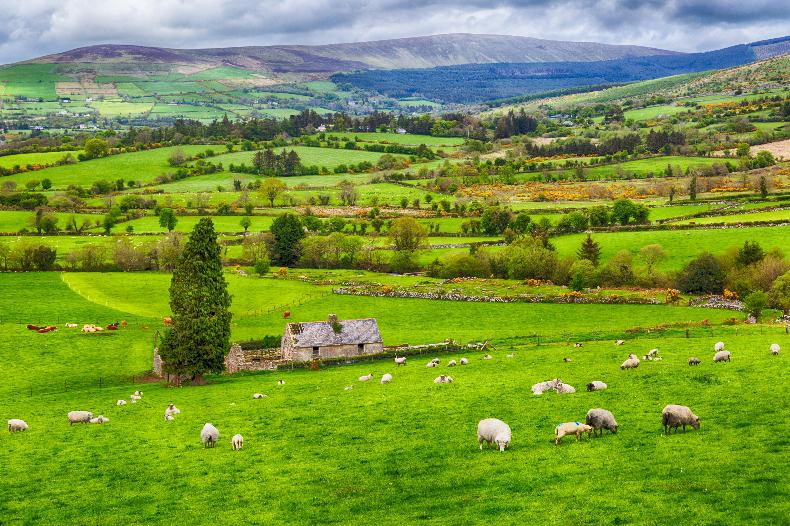Over the course of recent CAP reforms, farmers have had to do more and more to trigger the drawdown of payments. The Basic Payment Scheme (BPS) is no longer an income supplement to ensure farmers can simply produce affordable safe food. It is now an instrument to implement climate and environmental change on farms in Europe. It appears that between 20% and 30% of payments will be ring-fenced for environmental action in the next deal.
I recently asked a farmer client “what would happen if there were no farmer financial gains from farm subsidies or, worse again, if there were no farm subsidies at all?”
He answered as follows: “Sure, the price of land should fall to €3,000/acre and land rents should fall to about €50/acre.”
Then, pausing, he added: “On second thoughts, they probably would not fall at all, would they?”
This farmer is probably correct, for when it comes to land and farm profitability Irish farmers are an enigma. They would most likely do the complete opposite of what economic theory would suggest, in the short-term anyway.
However, in the long term, there would be an impact on the shape of industry. Teagasc National Farm Survey results for 2011 to 2019 indicate that arable, beef and sheep farmers would be severely affected in the no-farm-subsidy world (Table 1).
They would lose money and without off-farm income would not survive.
Land
In the no-farm-subsidy world, initially there would be no impact on the price or movement of land as suggested by my farmer client. However, many farmers would tire of supplementing their farm business with off-farm income and I predict they would cease farming in two or three years and then look to lease out and possibly eventually sell their holdings. This would cause the sale and lease price of land to fall over time.
Farmers and Farm Enterprises
Approximately 139,000 farmers make an application for the BPS each year in Ireland. If farming without subsidies produced the net profits or net losses as outlined in Table 1 there would be an exodus from farming.
In every crisis, as this would be, there will be those who are innovative and raise their head above the surface to defy the odds, ie beef and sheep farmers who diversify by selling their own meat, etc, but this will be a niche enterprise.
There will also be the hobby farmers who genuinely like part-time farming and are happy to subsidise their hobby with off-farm income. Unfortunately, some will find it difficult to cope with such change. The experience from New Zealand in the 1980s when it removed subsidies is somewhat dark. However, the majority would simply exit farming and move on with their lives.
AgriBusiness
The knock-on effect of fewer farmers would have a huge effect on agribusiness. A lower kill of cattle and sheep would be somewhat offset by an increase in cull cows and beef from the dairy herd. Dairying, however, will not be a land use option for all, therefore beef processors and all the associated business of hauliers, dealers, marts, merchants, vets, etc, would experience a big fall-off in business.
Rural Ireland and Countryside
The big question is how different would our countryside, rural towns and villages be in the no-farm-subsidy world. Some might argue that with better broadband people will migrate back to rural Ireland to work remotely from rural Ireland, countering the exodus to the big cities.
COVID-19 is clearly a dry run for this theory. However, the fall-off in business in all the associated agribusinesses would reduce money circulating in the rural economy.
The general rule is that for every €1 of CAP money received, there is a multiplier effect.
Change
To conclude, the equation is simple; farmers are spenders, therefore less money in farmers’ pockets equals less money spent on farms and in local communities, this would change the countryside forever.
Farming is not complicated. It is food production conducted in an environmentally friendly and sustainable manner. In today’s first-world society, it is not about feeding the poor, it is about providing choices for consumers. If today’s consumer wants choice in the food they eat and also requires farmers to save the planet, they will have to contribute financially to food production and climate change mitigation. That can be achieved by a) paying extra for food, b) by subsidising farmers directly, or c) a combination of both.
Farm subsidies are not only essential for farmers they are essential for all.
Michael Brady is a member of the Agricultural Consultants Association (ACA) and managing director at Brady Group: Agricultural Consultants & Land Agents. The Lodge, Lee Road, Cork.
Tel: 021- 4545120 | email: mike@bradygroup.ie
Your Money: it's that time of year - ensure your financial accounts are prepared
Your Money: tax reliefs increase the attractiveness of forestry
